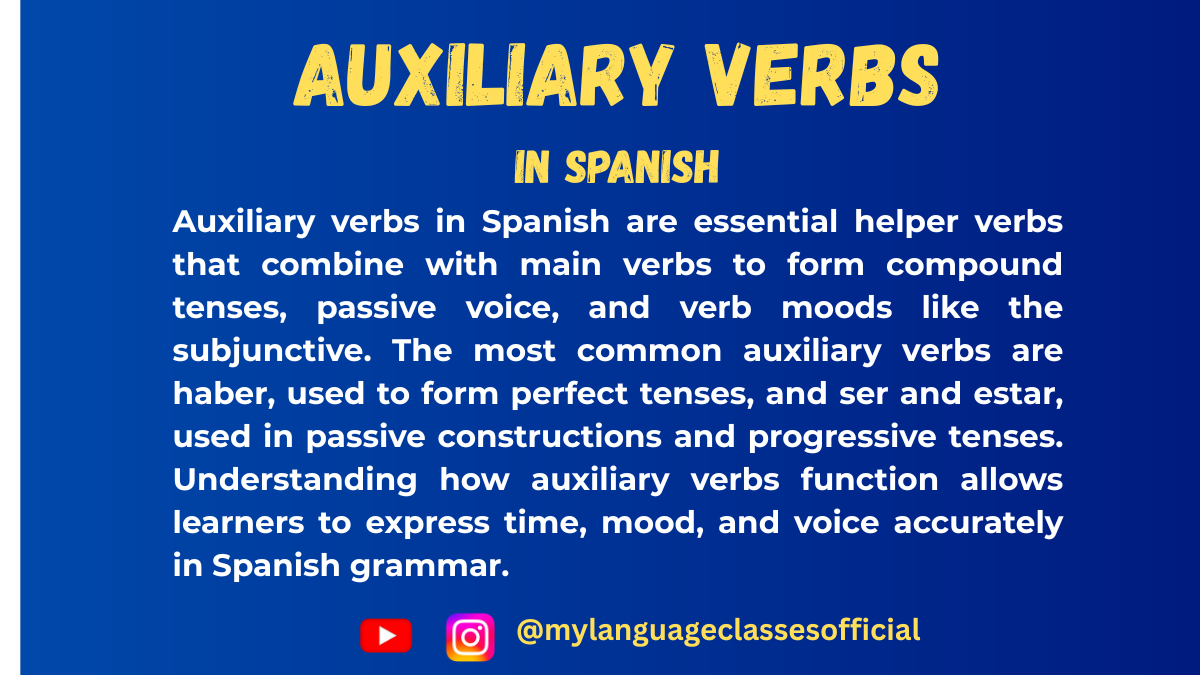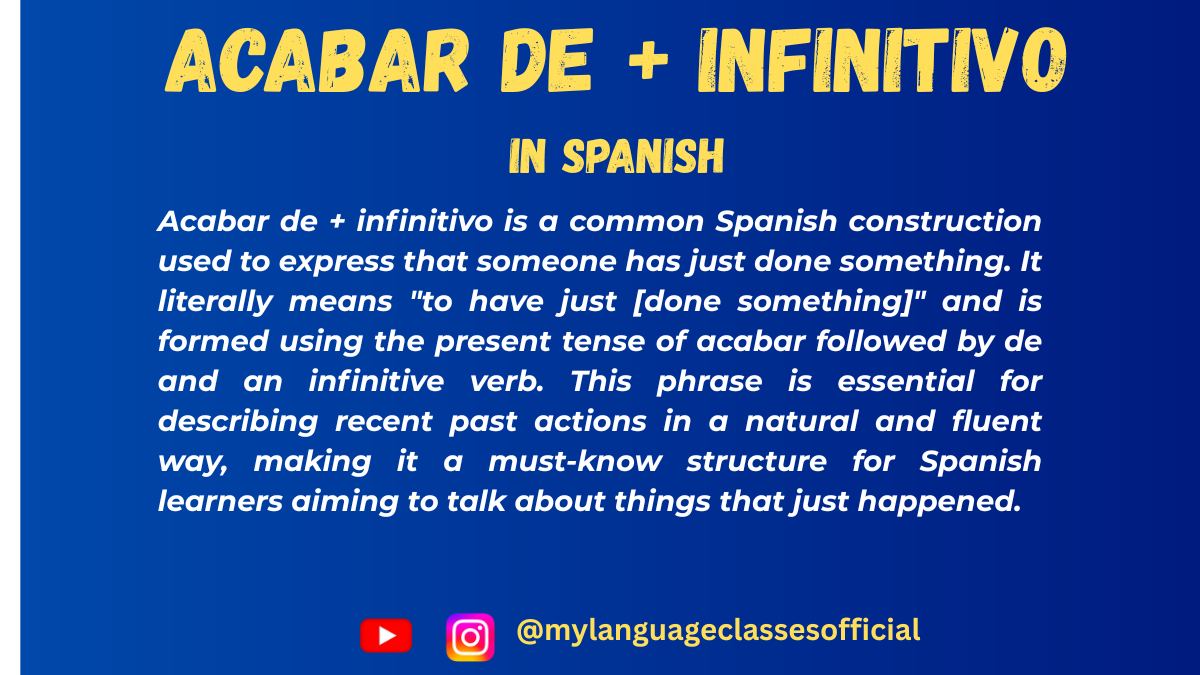Your cart is currently empty!
Tag: Spanish reflexive verbs
-

Auxiliary Verbs in Spanish: A Complete Guide
Auxiliary verbs, or “verbos auxiliares” in Spanish, play a crucial role in forming various tenses, moods, and grammatical structures. They are used in conjunction with main verbs to express nuances such as obligation, ability, probability, or temporality. Understanding auxiliary verbs is essential for mastering Spanish fluency.
Common Auxiliary Verbs in Spanish
- Haber (to have – for perfect tenses)
- Ser (to be – for passive voice and descriptions)
- Estar (to be – for progressive tenses and states)
- Tener que (to have to – for obligations)
- Deber (must/should – for necessity and advice)
- Poder (can – for ability and permission)
- Ir a (going to – for future actions)
- Querer (to want – for desires and intentions)
- Soler (to usually – for habitual actions)
1. Haber: Forming Perfect Tenses
Haber is used as an auxiliary verb to form compound tenses like the present perfect, past perfect, and future perfect.
Conjugation of Haber (Present Indicative):
- Yo he
- Tú has
- Él/Ella/Usted ha
- Nosotros/as hemos
- Vosotros/as habéis
- Ellos/Ellas/Ustedes han
Example Sentences:
- Yo he comido hoy. (I have eaten today.)
- ¿Has visto la película? (Have you seen the movie?)
Things to Keep in Mind:
- The past participle always remains unchanged (e.g., comido, visto, escrito).
- Haber must be conjugated in the correct tense and subject agreement.
2. Ser and Estar: Expressing Passive Voice and Progressive Tenses
- Ser is used for the passive voice and permanent characteristics.
- Estar is used for the present progressive tense and temporary conditions.
Conjugation of Ser (Present Indicative):
- Yo soy
- Tú eres
- Él/Ella/Usted es
- Nosotros/as somos
- Vosotros/as sois
- Ellos/Ellas/Ustedes son
Conjugation of Estar (Present Indicative):
- Yo estoy
- Tú estás
- Él/Ella/Usted está
- Nosotros/as estamos
- Vosotros/as estáis
- Ellos/Ellas/Ustedes están
Example Sentences:
- La puerta es cerrada por el profesor. (The door is closed by the teacher.)
- Estoy estudiando español. (I am studying Spanish.)
3. Tener que, Deber, and Poder: Expressing Obligation, Necessity, and Ability
- Tener que + infinitive: Expresses strong obligation.
- Ejemplo: Tengo que trabajar mañana. (I have to work tomorrow.)
- Deber + infinitive: Expresses necessity or recommendation.
- Ejemplo: Debes hacer ejercicio. (You should exercise.)
- Poder + infinitive: Expresses ability or permission.
- Ejemplo: ¿Puedes ayudarme? (Can you help me?)
4. Ir a + Infinitive: Talking About the Near Future
This structure is similar to the English “going to.” It is commonly used in spoken Spanish.
Example Sentences:
- Voy a viajar a España. (I am going to travel to Spain.)
- ¿Vas a llamar a tu madre? (Are you going to call your mother?)
5. Querer and Soler: Expressing Intentions and Habits
- Querer + infinitive: Expresses desire.
- Ejemplo: Quiero aprender español. (I want to learn Spanish.)
- Soler + infinitive: Expresses habitual actions.
- Ejemplo: Suelo leer antes de dormir. (I usually read before sleeping.)
Conjugation of Regular and Irregular Verbs in Auxiliary Verb Constructions
Spanish verbs fall into three categories: -AR, -ER, and -IR verbs.
Regular Verb Conjugation in the Present Participle (Gerundio)
- -AR verbs: hablar → hablando (speaking)
- -ER verbs: comer → comiendo (eating)
- -IR verbs: vivir → viviendo (living)
Past Participle Formation (Used with Haber)
- -AR verbs: hablar → hablado
- -ER verbs: comer → comido
- -IR verbs: vivir → vivido
Irregular Past Participles
- Decir → dicho (said)
- Hacer → hecho (done)
- Ver → visto (seen)
- Escribir → escrito (written)
List of Common Expressions with Auxiliary Verbs
Here are some daily expressions using auxiliary verbs:
- ¿Has comido? (Have you eaten?)
- Voy a salir ahora. (I am going to leave now.)
- Puedes ayudarme, por favor. (Can you help me, please?)
- Debemos estudiar más. (We must study more.)
- Tienes que llamar a tu madre. (You have to call your mother.)
Things to Keep in Mind
- Gender and Plurality: Auxiliary verbs themselves do not change for gender, but past participles used with “ser” must agree in gender and number (e.g., “La tarea fue hecha.”)
- Use of Articles: In general, articles (el, la, los, las) are necessary with nouns but not with infinitive verbs.
- Reflexive Verbs: When using auxiliary verbs with reflexive verbs, place the reflexive pronoun before the auxiliary verb or attach it to the infinitive (e.g., “Me voy a duchar” / “Voy a ducharme”).
Final Thoughts
Mastering auxiliary verbs in Spanish is essential for building more complex sentences and improving fluency. Understanding when and how to use “haber,” “ser,” “estar,” “tener que,” and other auxiliary verbs will help you navigate Spanish conversations with ease. Keep practicing with real-life examples, and soon, using these verbs will become second nature!
¿Quieres seguir aprendiendo? (Do you want to keep learning?) Stay tuned for more Spanish lessons!
If you enjoyed this lesson, be sure to check out more posts like this on my blog at My Language Classes. Don’t forget to subscribe my YouTube channel and follow me on Instagram for the latest language learning tips and lessons. Leave a comment below to share your thoughts, or ask any questions you have.
Happy learning! 😊

